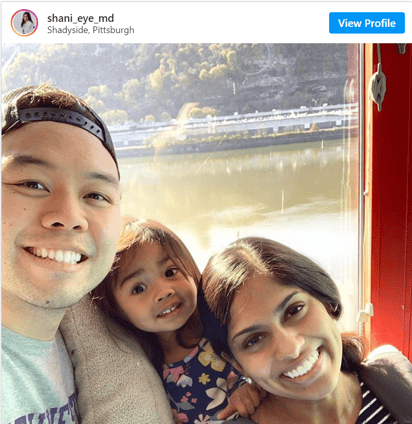-png.png?width=785&name=Blog%20Banner%20%26%20Thumbnails%20(1)-png.png)
If you look back on your life five years ago, would you have imagined it would look like it does now? In medicine, the learning curve can be quite steep without a support system of colleagues, family, friends, mentors, and more.
I’ll bet you have had tough experiences that are great lessons for the future generation. From residency or fellowship interviews, buying your first home, to taking that first job as an attending physician, the path to becoming a doctor presents many challenges. A better name for these times where you want to pull your hair out or scream into a pillow, is a learning experience after you get to the other side with the ability to reflect.
In November of 2019, a physician writer took to Instagram to share her top life lessons with the hashtag, #fivethingsIwishIknew. In good Instagramer fashion, other doctors responded to Dr. Laura Vater’s post with their top learning experiences, accompanied by the same hashtag.
One thing Dr. Vater shared with her followers was this: “You’ll learn more from your failures than successes; you’ll appreciate those who challenge you.”
As National Resident Match Program applications for open, another class of medical students will be deciding the fate of their career in medicine. To help newly minted MDs or DOs applying for residency or fellowship, we decided to pull together our favorite words of wisdom from participants in Dr. Vater’s hashtag campaign. Here are 10 things these doctors wish they knew.
The first tip for those who are entering their medical careers is great advice to remember on match day.
A emotional time when you will find out where you will be training for the next four+ years. You've been dreaming of this day since you began medical school or even as a child. Naturally you hopes have been built up. Unfortunately, this monumental day can be shattered if you don't match to the program you have top on your list.

In her post Dr. Sarah Kiani, a Hospitalist and mother of four girls advises:
"Expect little. Holding high expectations sets you up for disappointment. Take news as it comes and acknowledge that you cannot predict the future. If anything, expect the unexpected & go with the flow."
This tip isn't supposed to scare you or take away from your excitement on Match Day. The point is to help you think realistically. Envision training and living at any of your top five choices because only 47% of allopathic medical students matched to the top choice on their rank-order list in 2019, leaving 53% of seniors without their top choice. The annual match rank-list statistics show it's important to choose your top programs wisely as a higher percentage is more likely to wind up in their top three.
I'm ashamed to say it took me almost a month to write a thank you card for an wedding engagement gift. I kept think about what what I should say and how I needed to find stamps and other excuses. Once I actually got it down, it's crazy to think It took me a month for such a simple task. Have you ever avoided a simple task like this?
Procrastination can get the best of us, which is why Dr. Melanie Howell, a Pelvic Pain Specialist told her followers:
"Think less and just dive into it. 99.9% of the time, that task you thought was insurmountable just isn’t that hard."
There are much more miserable takes than writing a thank you card, but letting these types of tasks hang over your head sounds even sillier. Knock those tasks out so you can focus on the bigger, more fun ones.
You've probably heard this phrase many times, but it still remains relevant when you starting "adulting." If you're thinking about a starting a side-gig, marketing your medical practice, or applying for a leadership position, doubts may still come to mind.
To overcome these fears, host of the popular Youtube Fertility Educational Video Series, Dr. Anu Kathiresan, says:
"Don’t be afraid to put yourself out there (Ie video, blogs, etc.). What’s the worst thing that can happen? People don’t look at it? But, if it’s something that is helpful to others and inspires people, it is so worth it!"
You don't start a Youtube channel or Instagram account with thousands of followers. Dr. Kathiresan has leveraged social media and created consistent videos, which has helped her build a large following, ultimately growing her personal brand. Creating solid videos and sounding articulate do not come naturally to most people. Just like medical training to become a doctor, video content creation takes practice.
So what are you waiting for? Get our of your comfort zone and put yourself out there to reach your goals, whatever they might be!
You've been in school the majority of your life and now that you have the credentials next to your name, its time to put what you've learned to the test.
You know residency and fellowship will challenge every part of you with lack of sleep, immense stress, long work hours, and trying to find enough time for yourself.
Don't let the grueling nature of residency allow you to forget why you are here - to learn! Take Dr. Shanika Esparaz's advice. She is a mom, Board Certified Cataract/Retina Specialist, and co-creator (with her husband) of an inspiring Instagram account for millennials physicians.

In her "5 Things I Wish I Knew" post, Dr. Esparaz explains why prioritizing your thirst for knowledge is imperative:
"Residency is tough, but that is because you are in training to save someone’s vision 😷. There are times you will feel like this isn’t a right fit for you or you want to quit. It gets easier. Take advantage of every learning opportunity, I promise you, you’ll learn something from every patient and case you see."
Your education isn't complete when you graduate from medical school, the real learning has just begun.
Beginning training is an exciting time in your career, but it can also bring financial stressful as you transition. With a low intern salary, living expenses can seem almost impossible to keep up with. This time also means the grace period of your student loans is coming to an end. Student loans are full pesky nuances, which means repayment strategies are not a one size fits all type of deal.
Anesthesiologist and financial blogger, Dr. Derek has a money tip for you:
"Understand that money is just a tool and that time is much more valuable than money. With that said, pay off your school debt as fast as you can and invest early. Take advantage of the time value of money so that you can spend more quality time with family in the future."
The earlier you create a plan for your finances, the more prepared you will be to tackle your debt and reach your goals. More money does not make financial planning any easier. Before you enter practice, you have less money coming and going out. Developing good money habits while your finances are less complex can help you avoid the lifestyle creep when your attending paycheck hits your bank account.
Whether you want to become a chief resident or have plans to become a program director, your superiors have the power to select you for a promotion. Setting yourself apart and networking with the leaders in your field is prudent to elevate your career.
Intervential Readiologist and IR/DR Residency Program Director, Scott Fujimoto, DO, shares this suggestion from his experience of taking the path to residency program director:
"Get your promotion plan from your chairman. The tracks vary somewhat by institution, but they commonly include clinician–scholar, clinician–educator, and physician–scientist. Establish your track and stick to a plan!"
The squeaky wheel gets the grease! If you don't tell your attending or chairman you want to become a chief resident or program director, they will never know. Have an intentional conversation with colleagues, especially the ones who have the power to promote you, so they can help you get to the level you're aiming for.
Let's face it, life is hard. You will encounter challenges throughout your time on this earth you never thought were possible. Working with other people is one of those constant challenges. In addition to personal struggles outside of medicine, tough situations with colleagues, patients, patient families, or administration can knock you down.
As you heal from challenging experiences, take this practical advice from Cardio-thoracic Anesthesiologist and infertility warrior, Amita Kundra, MD:
"Overtime you will grow thick skin. Be sure to develop a stronger heart. "Medicine can be a stressful, yet grueling career. As you learn from your successes and failures, remember you are human and your feelings matter as much as your patients, children, or spouses's do.
This eighth tip from the physician hashtag campaign coincides with the last one. It may sound cliché, but doctors are trained to "do no harm" and put patients first, which is why this one is so important to remember. Prioritizing yourself of your patients and others who depend on you will make you a better, much happier doctor.
Rheumatologist and blogger, Dr. Maggie Cadet her passion for medicine and the importance of caring for herself here:
"Being a physician and helping people improve their quality of life is something I wanted to do since I was a little child. I felt it was a calling. I'm proud of the long journey I have been on and the noble profession I am a part of. However, this doesn't mean that I should sacrifice all the other aspects of my life in order to be a good doctor."
Physician burnout is a very prevalent issue in our healthcare system and it will continue if our doctors aren't happy. Worry about the things you can control, which is your vacation or free time. Find what makes you happy outside of medicine and prioritize it. Whether its quality time with family, fitness, travel, writing, etc., your overall wellness must take precedent in order for your to succeed.
Do you have big career or personal goals? Depending on the goal, it can take days, months, or even years to reach them. Let's say you decide to buy a house and you are going to finance it with a mortgage. You're even more excited to be be the first person in your group of friends to buy a house. You want to make a $30-40k down payment, but you only have $4,500 in your savings account. If you want to make the smart financial decision and save for your down payment, it could take more time than you expected to build enough savings up. Then you see your friend from med school post her beautiful new house on Instagram.
Dr. Amiethab Aiyer, Chief of the Foot and Ankle Service and assistant professor at the University of Miami, gives words of wisdom to help those who fall into the comparison trap we humans naturally create. His post says:
"It’s not a race; this is something I keep thinking to myself even now. We all make our way through life in our own way and the most important competitor is ourselves 💪🏾"
Whether you are wanting to move up in your career or your financial life, racing to the non-existent finish line could bring more harm than good for you. Would you rather be financially ready to buy a house or be the first to buy a house by taking out a bigger loan, resulting in more interest? Put a plan in place and trust the process.
When we say yes to someone's birthday party, you're saying no to something else. This may sound silly, but have you ever felt overcommitted with dinners, celebrations, or other social invitations? Time is a limited resource that we don't get more of. If you say yes to too many speaking engagements, volunteer opportunities, or research projects, you'll have less time for other things you love.
Ophthalmologist and "singing doctor", Dr. Bee Adante, gives great parting advice:
"The people who truly have your back are those who are there when you are going through hard times. Keep these people around you, because they will help you weather that storm. ❤️ The ones who hurt you aren’t worth your time and anger."
Taking time to write out who/what is most important to you and how you want to be present in those relationships gives you clarity around who you want to spend time with most. Armed with this information, you will find it easier to say no to opportunities, engagements, dinners, and other commitments that will steal time from the relationships that are most important to you. These commitments cost money and FOMO can make it even harder to say no, but in the long run, your relationships and your financial well-being will thank you.
This #fivethingsIwishIknew campaign shows the power of social media. Today, medical professionals across the globe can connect with one another, redefining the meaning of mentorship. You no longer have to live in close proximity to find and connect with a potential mentor or friend. With social media we have access to a much more extensive network at our fingertips. Dr. Amiethab Aiyer is able to provide mentorship to orthopaedic surgeons through his Instagram and Youtube channel.
Hopefully the advice these 10 doctors shared will help you find clarity as you navigate your career in medicine. If you want more regular guidance from leaders in medicine, check out the Prosperous Doc podcast, where Shane Tenny, CFP® interviews leaders in medicine who share about success and failures they've experience throughout their winding career paths.
As I mentioned in tip number five, the earlier you prioritize your finances, the better. Download the Student Loan Repayment Guide for actionable steps to guide you through your student loans with confidence!
CRN202209-271022

The team at Spaugh Dameron Tenny works to present timely educational content that benefits doctors and their unique financial situations.
When physicians accept a job offer from a hospital, they are often enticed with a signing bonus in the form of a forgivable loan. Given all the ...
Read More →Acronyms make up the language of the healthcare ecosystem. CMS, HIPAA, CPT, and RVU…to name just a few!
Read More →If the smell of pumpkin-spiced lattes and apple cider is in the air, it will soon be time for you to select your employer-offered benefits. Open ...
Read More →